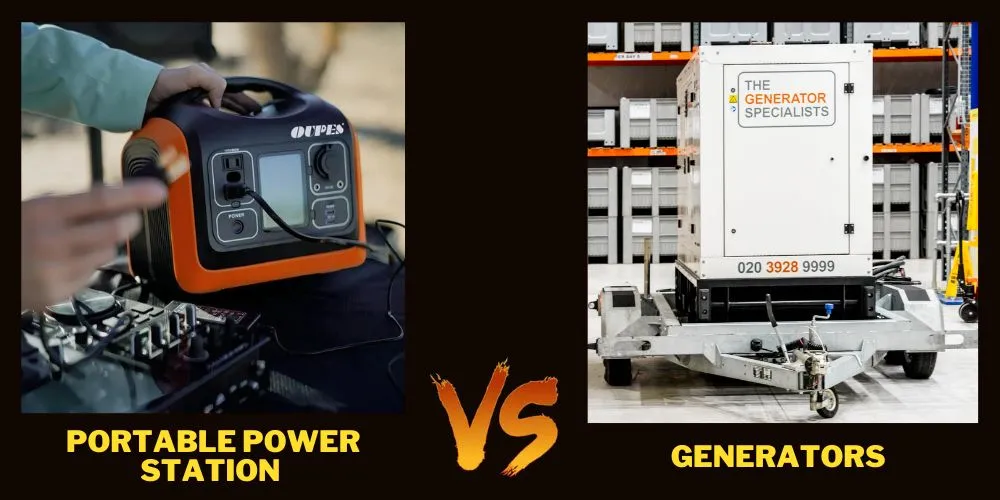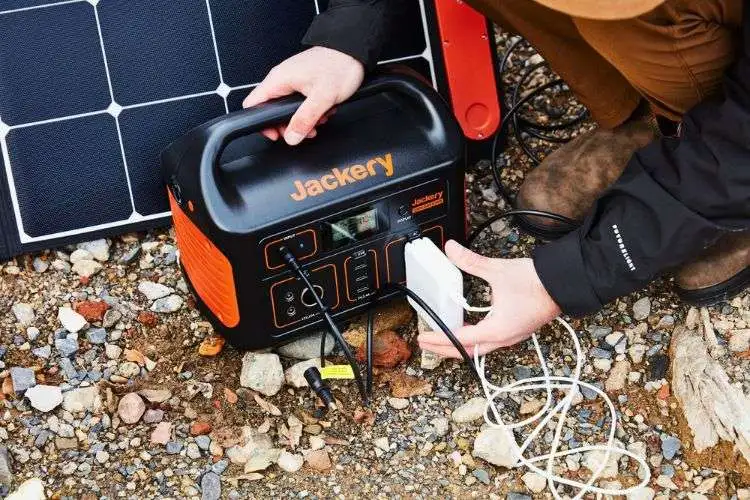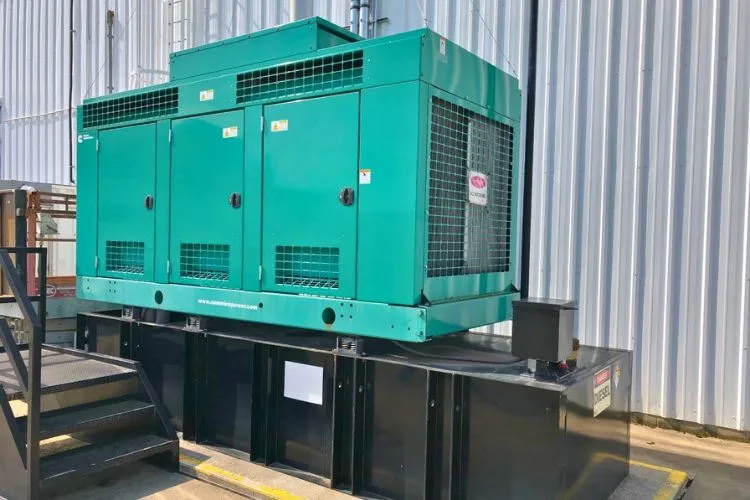In our digitally-driven world, reliable sources of power are more crucial than ever. Whether due to power outages or the need for electricity in remote locations, having a dependable backup is vital.
This article explores two leading solutions— portable power station Vs generator. Both have their place in our modern toolkit, but which is right for your situation? Here, we’ll delve into the distinctions to help guide your decision.

Understanding Portable Power Stations
A portable power station is essentially a large rechargeable battery. It draws energy from the grid or renewable sources like solar panels and stores it for later use.
When you need power, the station inverts the stored electricity, delivering it to your devices through standard outlets.

Definition and How They Work
Portable power stations use lithium-ion or lithium-phosphate batteries, which are known for their long lifespan and efficiency.
They are sophisticated devices that protect against overcharging and provide clean, stable power.
Advantages
One major advantage of portable power stations is their cleanliness. They produce no emissions, making them suitable for indoor use.
They’re also whisper-quiet, which is a boon in camping or residential areas where noise can be a nuisance.
The ease of use is a game-changer for many. Without the need for fuel, operation is as simple as charging the battery and then plugging in your devices.
Portability is another benefit. Many models come with handles, are relatively light, and can be carried by a single person.
Disadvantages
Despite their benefits, portable power stations do have limitations. They can only store a certain amount of energy, which might not be enough for prolonged use or running large appliances.
Recharge times can be lengthy and may require planning—particularly if relying on solar power. While prices are falling, the initial cost can still be steep compared to other options.
Understanding Generators
Generators are devices that convert fuel, like gasoline or propane, into electrical power. They’ve been the go-to solution for back-up power for many years.

Definition and How They Work
Inside a generator, an engine burns fuel to create mechanical energy. An alternator then converts this energy into electricity.
There are different kinds of generators, including inverter generators which produce cleaner power for sensitive electronics, and traditional models that might power entire homes.
Advantages
Generators shine when it comes to raw power output. They’re made to run for hours or even days, as long as they have fuel.
This makes them ideal for situations demanding a lot of energy, such as recovery efforts post-natural disasters.
They’re also versatile, operating on various fuel types and adaptable to numerous settings, from construction sites to outdoor events.
Disadvantages
The downside to generators includes noise and emissions. They’re typically quite loud and produce exhaust, making them ill-suited for indoor use without proper ventilation.
Maintenance is another factor. Regular upkeep, such as oil changes, and managing fuel stocks add to the total cost over time.
Portable Power Station Vs Generator
When it comes down to portable power stations versus generators, several factors set them apart. Each has scenarios where it excels, and understanding these will help you make the best choice.
Power Output and Capacity
Generators often have a higher output, measured in kilowatts, meaning they can power more devices simultaneously and for longer periods.
Portable power stations have a fixed capacity, once depleted, they need recharging—a process that can take time.
Portability and Ease of Use
In terms of portability, power stations usually win. They’re typically easier to transport and do not require constant refueling.
Generators are heavier and, depending on the fuel type, may require more physical effort to move.
Cost Implications
Initially, portable power stations may cost more. However, with no need for fuel and minimal maintenance, they can be more economical over time.
Generators often have a lower upfront cost but consider the ongoing expense of fuel and maintenance.
Environmental Impact
The environmental impact is also a significant differentiator. Portable power stations have a small ecological footprint, especially if charged with renewable energy.
Generators emit greenhouse gases during operation, contributing to air pollution and climate change.
Safety and Convenience
Safety and convenience factor heavily into the decision. Power stations are safer to use in confined spaces and require less technical know-how.
Generators can pose risks with fuel storage and exhaust, and they often need a more hands-on approach for operation.
You may also read: Open Frame vs Closed Frame Generator | Diesel vs Gasoline Generators
Pro Tips for Buyers

- Assess your power needs before purchasing. Look at wattage requirements of the devices you intend to power and compare this with the outputs of the station or generator.
- Portability is crucial if you’ll be moving your power source often. Weight and size should be top considerations.
- Think long-term. Will your energy needs change? If so, look for a solution that can adapt to new demands.
- Is silence golden for you? If noise is a concern, especially in camping or residential areas, lean towards a portable power station.
Frequently Asked Questions (FAQs)
Can portable power stations run large appliances?
Large appliances typically exceed the output capacity of most portable power stations. However, some higher-end models can manage short-term use of refrigerators or microwaves.
How long do generators last?
A well-maintained generator can last for many years. Regular servicing aligns with the manufacturer’s recommendations and will extend its lifespan.
Are portable power stations safe to use indoors?
Yes, portable power stations don’t produce emissions and are generally considered safe for indoor use.
What maintenance do generators require?
Generators need regular oil changes, air filter swaps, and general inspections to ensure smooth operation.
Can I charge a portable power station using a solar panel?
Many portable power stations are compatible with solar panels, allowing for off-grid charging. This setup requires specific adapters and sufficient sunlight.
Conclusion:
The choice between a portable power station and a generator is not one-size-fits-all. It’s a decision grounded in individual energy needs, consideration for the environment, and factors like portability and noise.
By weighing these elements carefully, you’ll find the power solution that best aligns with your requirements and values.
